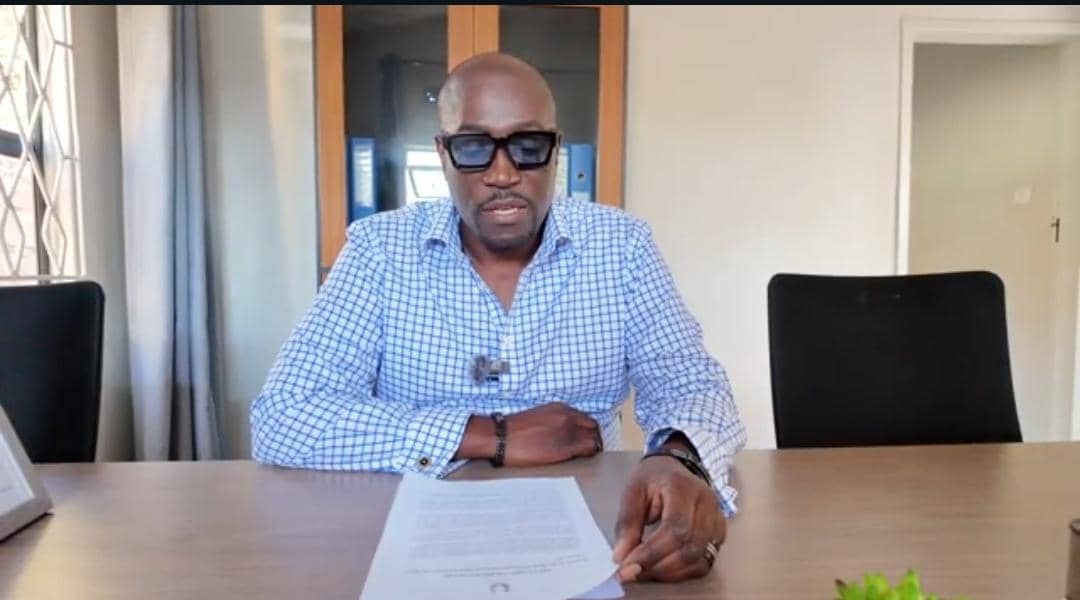Call for Justice After Kafue River Spill

ZEJC is “actively exploring legal options and will not hesitate to pursue the various options available to ourselves in the public interest and on behalf of the affected communities should the real status of the scale of the contamination and the results of comprehensive assessment remain undisclosed.
By Francis Maingaila
Lusaka, August 18, 2025 – The Zambia Environmental Justice Coalition (ZEJC) has issued an urgent call for action following the environmental disaster caused by Sino Metals and Rongzhing Mining, which in February 2025 polluted the Mwambashi Stream, Luela Streams, and the Kafue River which left communities with unsafe water, disrupted livelihoods, and increased health risks.
Ceasar Katebe, Programmes Manager at the Zambia Alliance for Women, on behalf of the coalition, told journalists in a statement that the coalition is demanding an immediate halt to all illegal mining activities at the site and a suspension of plans to allow Sino Metals to resume operations.
He stressed that affected communities must be relocated “to safer areas with adequate water supply, food, and land to continue with their survival livelihood activities.”
Katebe added that a full cleanup and environmental restoration must be conducted “under the direction and supervision of independent, qualified, and experienced scientists,” especially with the rainy season approaching.
The coalition also demanded full transparency and community involvement in compensation, including the removal of legal waivers that limit future claims.
Katebe said the coalition is seeking “a truly independent and publicly accountable Environmental Impact Assessment process, with community and non-state actors’ participation and oversight.”
He further urged the government to provide “public assurance that legal and regulatory actions will be taken against the polluter in line with the Environmental Management Act.”
ZEJC expressed alarm over conflicting statements from government officials, mining companies, and international observers regarding the pollution incident.
The coalition highlighted the U.S. Embassy’s alert on August 6, 2025, followed by a government press briefing on August 11, which it described as misleading.
Of particular concern were comments from Minister of Green Economy and Environment, Hon. Mposha, who relied on uncertified laboratory results and referenced only five heavy metals—cadmium, cobalt, copper, manganese, and zinc—despite Finnish consultant reports identifying 24 metals, 16 of which exceeded safe limits, including nickel, lead, arsenic, zinc, and uranium.
ZEJC described this underreporting as “misleading” and said it raises serious public health concerns.
The coalition also questioned claims that treating Nkhana water with chlorine gas eliminates all heavy metals, stressing that “independent scientific expertise is needed here, as our understanding is that chlorine does not remove all heavy metals,” and that the public deserves transparency.
Communities, already facing contamination fears, remain without clear guidance on water safety.
The coalition raised concerns over the handling of the report produced by Drizit Zambia, the initial consultant engaged to assess the polluted site.
According to ZEJC, the report has not been made public, and its recommendations—highlighting emergency measures—have not been implemented.
Attempts to discredit Drizit and its findings were described as “deeply concerning,” leaving residents unsure whether critical interventions have been applied.
When Bloomberg sought comment on the Drizit revelations, Hon. Mposha stated he could not comment because the report had not been received “officially” through ZEMA, despite copies circulating publicly.
ZEJC criticized this response as “wholly inadequate and misleading” and said that six official government updates in six months “is nowhere near sufficient and conveys a dangerous lack of urgency,” particularly for directly affected communities.
The coalition also condemned the proposed compensation of K16.2 million for roughly 700 affected individuals, noting that some could receive as little as K400. ZEJC said the process “lacks transparency” and rejected the characterization of it as consultative.
The inclusion of legal waivers releasing Sino Metals from future liability was described as “deeply problematic and disconcerting given the Government’s assurances that the current compensation package was interim in nature,” undermining the rights of affected individuals in the absence of a complete environmental and health assessment.
ZEJC reiterated that dialogue alone cannot substitute for justice, saying the coalition is “actively exploring legal options and will not hesitate to pursue the various options available to ourselves in the public interest and on behalf of the affected communities should the real status of the scale of the contamination and the results of comprehensive assessment remain undisclosed.”
The coalition also announced that it is investigating reports of ongoing mining activity around the Sino Metals site and will pursue legal action if confirmed.
The coalition concluded by affirming that “as civil society, we assure the public that we remain vigilant and will not relent until a semblance of justice prevails,” emphasizing its commitment to protecting communities, ensuring accountability, and securing full environmental restoration.



Comments
Post a Comment